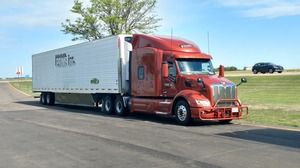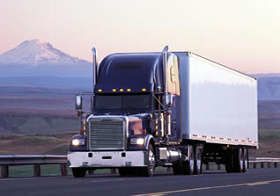New Driver Landed Awesome Job Thanks To ...
Topic 8764 | Page 1

You are quite welcome. I know I don't post as often as I should sometimes, but until recently I was on the road and did not have the time most of the time.
Since I have been home on FMLA medical leave I have taken a more active role here on the forum.
Keep everyone posted as to how things are going for you, I am sure a lot of other folks would like to hear another success story as I would.
Ernie
Fm:
Dispatcher, Fleet Manager, Driver Manager
The primary person a driver communicates with at his/her company. A dispatcher can play many roles, depending on the company's structure. Dispatchers may assign freight, file requests for home time, relay messages between the driver and management, inform customer service of any delays, change appointment times, and report information to the load planners.Welcome Pork Chop! It's great to hear you were able to land an LTL job right off the bat. The Northeast is really the sweet spot for LTL companies. That's a great gig to have.
And we're certainly glad to hear our High Road Training Program and other resources were a big help to you. Sounds like you're in a great position and you've done well for yourself already. Keep it up!

CDL:
Commercial Driver's License (CDL)
A CDL is required to drive any of the following vehicles:
- Any combination of vehicles with a gross combined weight rating (GCWR) of 26,001 or more pounds, providing the gross vehicle weight rating (GVWR) of the vehicle being towed is in excess of 10,000 pounds.
- Any single vehicle with a GVWR of 26,001 or more pounds, or any such vehicle towing another not in excess of 10,000 pounds.
- Any vehicle, regardless of size, designed to transport 16 or more persons, including the driver.
- Any vehicle required by federal regulations to be placarded while transporting hazardous materials.
LTL:
Less Than Truckload
Refers to carriers that make a lot of smaller pickups and deliveries for multiple customers as opposed to hauling one big load of freight for one customer. This type of hauling is normally done by companies with terminals scattered throughout the country where freight is sorted before being moved on to its destination.
LTL carriers include:
- FedEx Freight
- Con-way
- YRC Freight
- UPS
- Old Dominion
- Estes
- Yellow-Roadway
- ABF Freight
- R+L Carrier

I've found this site to be a great resource. I just started driving recently too, and I got a great job as a tanker yanker making great pay right out of school. These people are more than happy to teach me, are safety oriented and are very pro-driver. They were willing to work with me since I had military driving experience. I can thank those who left their advice here for helping guide me towards this job. Now I'm finding myself refreshed, motivated and getting well paid for my efforts without having to start at one of the big starter companies. Glad to know there are people out there willing to help with advice, and willing to tell it how it is. Makes a difference, doesn't it?
I was about to go LTL , but between getting older and wanting to drive a tanker, I just went for it. Glad to hear you got hooked up!
LTL:
Less Than Truckload
Refers to carriers that make a lot of smaller pickups and deliveries for multiple customers as opposed to hauling one big load of freight for one customer. This type of hauling is normally done by companies with terminals scattered throughout the country where freight is sorted before being moved on to its destination.
LTL carriers include:
- FedEx Freight
- Con-way
- YRC Freight
- UPS
- Old Dominion
- Estes
- Yellow-Roadway
- ABF Freight
- R+L Carrier
HOS:
Hours Of Service
HOS refers to the logbook hours of service regulations.
I'm VERY happy that the linehaul thread has been helping folks. My whole purpose in starting it was to spread the word, knowing that I appreciated somebody else's thread about linehaul on a different site. Linehaul threads are not as plentiful as the truckload OTR threads.
Dave H., had I not gone linehaul, I would've gone the tanker route probably. I looked at pulling reefers and dry vans with Crete and Shaffer (and Prime), but ultimately I know that tanker would've been my end choice. I'll probably never leave Old Dominion, and I do get the chance to mix up my doubles with a 53' or 48' van every now and then, but I'll probably never have the experience of pulling a tanker. That's OK, I love my job, and love being a linehaul driver for OD.
OTR:
Over The Road
OTR driving normally means you'll be hauling freight to various customers throughout your company's hauling region. It often entails being gone from home for two to three weeks at a time.
Linehaul:
Linehaul drivers will normally run loads from terminal to terminal for LTL (Less than Truckload) companies.
LTL (Less Than Truckload) carriers will have Linehaul drivers and P&D drivers. The P&D drivers will deliver loads locally from the terminal and pick up loads returning them to the terminal. Linehaul drivers will then run truckloads from terminal to terminal.Doubles:
Refers to pulling two trailers at the same time, otherwise known as "pups" or "pup trailers" because they're only about 28 feet long. However there are some states that allow doubles that are each 48 feet in length.
Dry Van:
A trailer or truck that that requires no special attention, such as refrigeration, that hauls regular palletted, boxed, or floor-loaded freight. The most common type of trailer in trucking.Reefer:
A refrigerated trailer.
OWI:
Operating While Intoxicated
New Reply:
New! Check out our help videos for a better understanding of our forum features

















Preview:








 TT On Facebook
TT On Facebook
I just started training as a linehaul driver for an LTL trucking company.
About 6 or 7 months ago, I decided I needed to change careers, and driving came up on my radar. Initially, I was convinced that there was no way to break into the business other than going OTR for at least a year, but this site, and specifically a thread by 6 string about landing an LTL job as a rookie driver showed me there is another way to go.
I have thanked 6 string via email several times, but I wanted to post this publicly to make sure anyone considering a driving career reads his posts.
I also want to thank Brett for putting this site together. When I was studying for my CDL written tests, my CDL school gave us a CD with a ton of practice questions and answers. But the way Trucking Truth's High Road Training is set up really prepared me for the tests. I ended up passing General Knowledge, Combinations, Air Brakes, Doubles/Triples, Tankers, and Hazmat exams all on the same day and all on the first try. I'm not trying to say I'm so smart, but the point is that Trucking Truth's CDL study guide really gets you well prepared.
Also, if anyone is in Northern New Jersey and looking for a CDL school, you have to take a long look at Jersey Tractor Trailer Training. In my opinion, they are a great school for a variety of reasons. First, they only give one on one driving lessons. Because of that, they are able to get you ready for your road test in about half the time that other schools take. Plus, they are a lot less expensive than any other school I found in this ares.
And finally, I want to say thanks to all the veteran and new drivers who post on this site. Reading through the threads in this forum, you can pick up a ton of knowledge, and I truly have.
Thank you, thank you, and thank you all.
CDL:
Commercial Driver's License (CDL)
A CDL is required to drive any of the following vehicles:
HAZMAT:
Hazardous Materials
Explosive, flammable, poisonous or otherwise potentially dangerous cargo. Large amounts of especially hazardous cargo are required to be placarded under HAZMAT regulations
LTL:
Less Than Truckload
Refers to carriers that make a lot of smaller pickups and deliveries for multiple customers as opposed to hauling one big load of freight for one customer. This type of hauling is normally done by companies with terminals scattered throughout the country where freight is sorted before being moved on to its destination.
LTL carriers include:
OTR:
Over The Road
OTR driving normally means you'll be hauling freight to various customers throughout your company's hauling region. It often entails being gone from home for two to three weeks at a time.
Linehaul:
Linehaul drivers will normally run loads from terminal to terminal for LTL (Less than Truckload) companies.
LTL (Less Than Truckload) carriers will have Linehaul drivers and P&D drivers. The P&D drivers will deliver loads locally from the terminal and pick up loads returning them to the terminal. Linehaul drivers will then run truckloads from terminal to terminal.Doubles:
Refers to pulling two trailers at the same time, otherwise known as "pups" or "pup trailers" because they're only about 28 feet long. However there are some states that allow doubles that are each 48 feet in length.